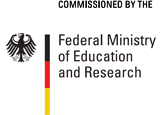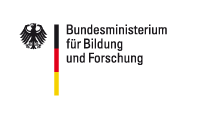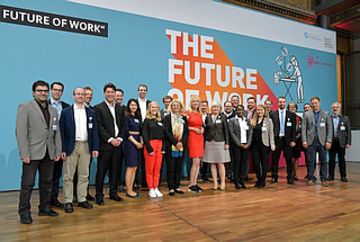Societal changes and trends such as demographic change or mentality shifts about what work means in individual life concepts are noticeable in people, in companies and also in society as a whole. They require new business models, innovative organisational structures as well as new skills and qualifications with regards to employees and managers.
BMBF Research Marketing Campaign 'The Future of Work' (2019-2020)
The research marketing campaign 'The Future of Work' picks up on these topics. It was launched im May 2019 as an international continuation of the BMBF's national Science Year 'Arbeitswelten der Zukunft' ('Working Life of the Future'). Over a period of 18 months, the campaign will provide 10 excellent research networks with a platform to present their innovative projects for the future of work in three target countries – France, Japan and the USA – in order to win international partners. The project activities will be accompanied by an overarching campaign coordinated by the International Bureau of the DLR Project Management Agency. This will comprise central communication measures and events, both in the three target countries and in Germany. Buliding on the national Year of Science 2018, the research marketing campaign 'The Future of Work' focuses on the following topics:
- Topic 1: Education and BigData
What will the work environment of the future demand from humans? How can we educate ourselves to meet these requirements, especially with regard to the handling of data? - Topic 2: Industry and Networking
What opportunities do digitisation, artificial intelligence and Industry 4.0 offer for the future of work? How can human-technology interfaces be designed for interaction in modified digitised work processes? - Topic 3: Technology and Organisation
How will new technologies change the work environment? What are the social and organisational implications and how can we handle them? - Topic 4: Workplace and Society
How can new work models be implemented? How will social trends and individual life concepts be taken into account?
© BMBF | Source: YouTube
Funding opportunities
The related BMBF funding announcement (application deadline was 15 October 2018) addressed networks that are researching innovative solutions for the future of work in one of the above mentioned areas. They should be interested in internationalising their activities and making a significant contribution to promoting Germany as a research and innovation location through targeted marketing measures. Up to 10 research networks will be funded with a maximum grant of € 200,000 each. To increase the professionalisation and qualification in research marketing, the networks are expected to participate in the events and marketing workshops of the umbrella campaign. In addition, it is desirable that in particular German junior scientists should be entrusted with network coordination.
Background
The BMBF research marketing campaigns are anchored in the Federal Government's Internationalisation Strategy and designed to enhance the visibility of Germany as an attractive location for education, research and innovation under the brand 'Research in Germany'. The aim is to positively influence the image of Germany abroad, to raise the target group's awareness of access routes to Germany as a research location, and to provide the German research landscape and researching companies in Germany with a skill set in research marketing.
In its current High-Tech Strategy 2020, the German Federal Government has defined the 'Innovative Work Environment' as one of six priority tasks for future prosperity and quality of life. It aims to create an innovative work environment with healthy and safe working conditions that will develop the skills of the employees, provide fair pay and adequately acknowledge their performance.










